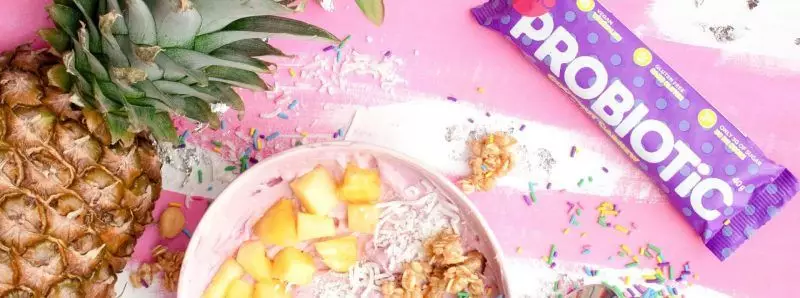
Contrary to many speculations that all bacteria are harmful, in fact, in our bodies, we have both good and bad bacteria, which live symbiotically and at peace when both are balanced and none of the two types “takes the lead.”
And the helpful bacteria in our gut are called probiotics! They are basically a mix of different yeasts and live microorganisms, which have the function to support the balance of your microbiota. [1]
Some of the benefits of probiotics include preventing the development of gastrointestinal diseases (constipation, diarrhea, irritable bowel syndrome, immune function, etc.), increasing lactic tolerance, enhancing the absorption of B complex vitamins and calcium, and keeping the gut microbiota healthy and in perfect condition. [2]
When there is decreased abundance of probiotic bacteria in your gut, a negative imbalance is created in the microbiota. This increases the risk for development of various diseases associated with immune system, gut health, metabolism, liver, and others. [3]
In such cases, it’s recommended to consume probiotic-rich foods, in order to restore the balance in our gut.
This article will show you the 5 foods richest in probiotics (which are also affordable). The daily consumption of those can help to achieve proper gastrointestinal microbalance.
Yogurt
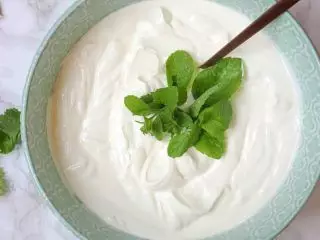
The real and authentic yogurt can be a great source of probiotics. [4] It is basically fermented milk, which has a slightly sweet-sour taste and is full of beneficial microorganisms and other nutrients, important for our health.
It contains plenty of probiotic bacteria, as well as calcium and cobalamin (B12) [5]. Various studies have looked into the health properties of yogurt, which are associated with reduced inflammation, strong immune system, supported gastrointestinal health, and balanced your blood pressure. [6]
Learn how to recognize the real yogurt in our dedicated blog post!
Cheese
 Some types of cheeses like aged or traditional cheddar, gouda, mozzarella, and gruyere are rich sources of probiotics. [7] Those are not only super delicious but also packed with nutrients: Calcium, vitamin A and cobalamin (vitamin B12). [8]
Some types of cheeses like aged or traditional cheddar, gouda, mozzarella, and gruyere are rich sources of probiotics. [7] Those are not only super delicious but also packed with nutrients: Calcium, vitamin A and cobalamin (vitamin B12). [8]
On the negative side, cheese may have high saturated fat content, which means that you should pay attention to the daily amounts you consume. It’s always best to stick to balanced diet and include both saturated and unsaturated fats such as olive oil, sesame oil, or fish.
Pickles
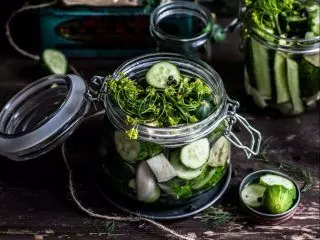 Here it is important to mention that only classically pickled cucumbers can be rich in probiotics (soaked in just water and salt and fermented). [9] The ones that are pickled in vinegar solution couldn’t not provide you with such probiotic benefits.
Here it is important to mention that only classically pickled cucumbers can be rich in probiotics (soaked in just water and salt and fermented). [9] The ones that are pickled in vinegar solution couldn’t not provide you with such probiotic benefits.
The pickles are low in calories, fats, and carbs, which makes them great for snacking in between meals. [10] On the negative side, sometimes they could have high sodium content because of the brine they are soaked in. So if you suffer from cardiovascular diseases or high blood pressure conditions, pay attention to the amount you of pickles you eat. [11]
Kombucha
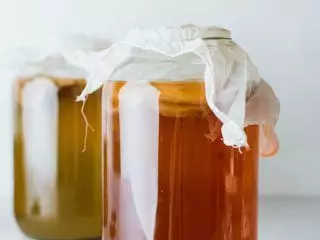 According to the Department of Food Science in the National Chung‐Hsing University, kombucha could be a great source of probiotic bacteria, water-soluble vitamins (vitamins B complex and C), and polyphenols, which by themselves are strong antioxidants.
According to the Department of Food Science in the National Chung‐Hsing University, kombucha could be a great source of probiotic bacteria, water-soluble vitamins (vitamins B complex and C), and polyphenols, which by themselves are strong antioxidants.
In addition, the drink has low calories, doesn’t contain fats or carbs, and may have a positive effect on reducing inflammation and fighting oxidative stress. [12]
Tempeh
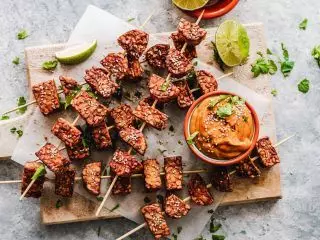 Tempeh is an Indonesian food made from fermented soybeans. It’s very similar to tofu but is firmer and with a more smoky and earthy flavor. This food is very high in protein, which makes it great choice for vegetarians and vegans. [13]
Tempeh is an Indonesian food made from fermented soybeans. It’s very similar to tofu but is firmer and with a more smoky and earthy flavor. This food is very high in protein, which makes it great choice for vegetarians and vegans. [13]
Besides from being an excellent probiotic source, the tempeh is rich in magnesium, iron, and contains highly-absorbing calcium. It may also promote gut health and, reduce LDL cholesterol and fight oxidative stress. [14]








